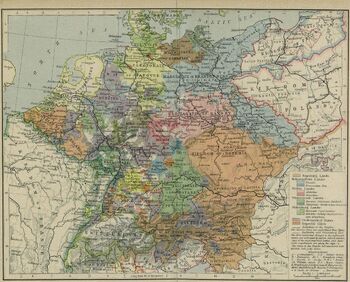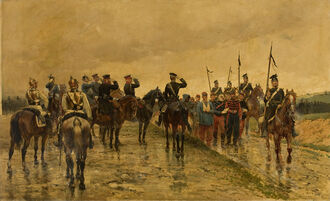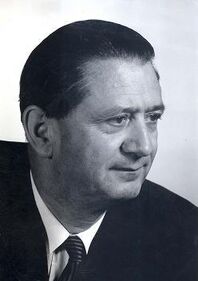m (→The Global War) |
|||
| Line 40: | Line 40: | ||
Recovery from the ravages of war was slow at first, but increased rapidly after [[Mason Doctrine]] aid began to come from the C.N.A. in 1950. By 1956, Germany had fully recovered from the war, and some Mason Doctrine aid was secretly diverted to the military. |
Recovery from the ravages of war was slow at first, but increased rapidly after [[Mason Doctrine]] aid began to come from the C.N.A. in 1950. By 1956, Germany had fully recovered from the war, and some Mason Doctrine aid was secretly diverted to the military. |
||
| − | [[File:Markstein.jpg|thumb|left|198px|Chancellor Adolph Markstein.]]On 10 July 1962, the German government received film showing the detonation of the first [[atomic bomb]] by Kramer Associates eleven days earlier, and responded by initiating its own atomic weapons program. When [[Vincent Mercator]] of Mexico called in November 1962 for an international conference in Geneva the following summer, Chancellor [[Adolph Markstein]] refused to attend, calling the conference "a propaganda play and nothing more." |
+ | [[File:Markstein.jpg|thumb|left|198px|Chancellor Adolph Markstein.]]On 10 July 1962, the German government received film showing the detonation of the first [[atomic bomb]] by Kramer Associates eleven days earlier, and responded by initiating its own atomic weapons program. When [[Vincent Mercator]] of Mexico [[Offensive of the Dove|called]] in November 1962 for an international conference in Geneva the following summer, Chancellor [[Adolph Markstein]] refused to attend, calling the conference "a propaganda play and nothing more." |
The successful test of a British atomic bomb in Australia on 14 February 1965 seemed to portend war, and in November British air bases in Scotland were placed on full alert. However, on 16 November, the German government announced that it had built its own atomic bomb, and on 20 November the German Empire signed a treaty with the newly-formed [[Associated Russian Republics]]. On 19 March 1966, a German atomic bomb was successfully tested in eastern Russia, and by the end of 1966 German airmobiles based in France and the Netherlands were armed with atomic weapons. |
The successful test of a British atomic bomb in Australia on 14 February 1965 seemed to portend war, and in November British air bases in Scotland were placed on full alert. However, on 16 November, the German government announced that it had built its own atomic bomb, and on 20 November the German Empire signed a treaty with the newly-formed [[Associated Russian Republics]]. On 19 March 1966, a German atomic bomb was successfully tested in eastern Russia, and by the end of 1966 German airmobiles based in France and the Netherlands were armed with atomic weapons. |
||
Revision as of 20:33, 22 November 2014

Germany circa 1786.
Germany can refer either to the Germanophone area of Central Europe, or after 1799 to the Germanic Confederation and its successor state, the German Empire.
The Habsburg War and the Germanic Confederation
Following the end of the Seven Years War in 1763, Germany consisted of a number of kingdoms and principalities, most of which were nominal members of the Holy Roman Empire. The two chief German states were the Habsburg Monarchy of Austria, Bohemia, Moravia, and Hungary, and the Kingdom of Prussia. Two other important German states were the Kingdom of Hanover, which was in a personal union with Great Britain, and the Electorate of Bavaria.
The rivalry between the Habsburg Monarchy and the Kingdom of Prussia was resolved during the Habsburg War of 1795 to 1799. The war ended in defeat for the Habsburgs, and by the terms of the Treaty of Aix-la-Chapelle, the Holy Roman Empire was dissolved, while a Prussian-dominated Germanic Confederation was created that excluded the Habsburg dominions. King Frederick William III of Prussia was named King of the Germanic Confederation.
At the height of the Mexican Civil War in March 1816, Clericalist leader Simón Figueroa issued an appeal for aid from the rest of the world to halt the slaughter of suspected Clericalists by Federalist troops. However, no European nation responded to his request due to fears of an imminent war between the Germanic Confederation and Austria.
The Germanic Confederation was one of three nations, along with the Netherlands and Spain, that made up the arbitration panel created by Governor-General Winfield Scott and President Miguel Huddleston in April 1845 to resolve the border dispute between the Confederation of North America and the United States of Mexico. Due to the last-minute withdrawal of King Miguel of Spain, the panel did not meet until 1853, and as a result did not issue a report until 15 June 1855.
Industrialization and Colonialism
The Germanic Confederation began undergoing rapid economic growth in the 1860s, and by 1878 had surpassed France as continental Europe's leading industrial power. King Frederick William V was able to negotiate a treaty with President Miguel Rubio of Guatemala in 1869 giving a German consortium the rights to construct an interoceanic canal. However, Rubio was overthrown in March 1870, and rights to the canal were awarded to Kramer Associates.

The Franco-German War, 1878-1880.
Despite this setback, Frederick William initiated a large-scale naval construction program in 1870, and in 1873 German merchants began to invade French markets in Africa and Asia. This led to the outbreak of the Franco-German War in November 1878. The French armies were no match for the better-organized and equipped Germans, and by the end of 1879 two German armies had surrounded Paris, while the German Navy had seized France's overseas territories. However, defeat in the war led to the outbreak of the French Revolution in December, and German troops occupying Paris were radicalized and joined the revolutionaries. In 1880 the revolution had spread to the Germanic Confederation, and by the time the various uprisings had been put down in March, Berlin had been devastated. In the aftermath of the uprisings, the Free German Party arose under Karl Ollenhauer, and the German Diet was forced to agree to moderate reforms. As revolutionary chaos reigned in the rest of Europe, some parts of Germany were overrun for a time by marauding gangs. Tens of thousands of Germans emigrated to Ireland and Iceland, while others settled in the North American confederation of Manitoba before Governor-General John McDowell suspended immigration in 1882.
The Germanic Confederation signed a nonagression pact with Great Britain in 1883 that was directed against revolutionary France. This was followed by the Amisdad Treaty with the U.S.M. in 1886, and shortly thereafter by a large loan to the government of Chief of State Benito Hermión. The two countries remained allies after Hermión's fall from power in 1901. Germany intervened in Argentina on three occasions in the 1890s.
Following the disintegration of the Russian Empire in 1900, the Germanic Confederation intervened to end the Russian Revolution, along with Great Britain, France, and Austria. Germany also signed treaties with the Ottoman Empire, Poland, and the Baltic States that were directed against the Russian successor states, as well as an "understanding" with Italy which may have been directed against France. However, despite its treaty with the U.S.M., Germany did not declare war on France during the Hundred Day War of 1914.
Starting in the 1920s, the Germanic Confederation began expanding into British spheres of influence in Asia and Africa, and German businessmen received oil concessions from the Ottoman Empire in 1933. The Germans were also enlarging their army, which numbered 1.9 million men by 1933, as well as their air arm, which had over 900 airmobiles of the latest design. Governor-General Douglas Watson was aware of these developments, and he included a visit to Berlin in his European grand tour of March and April 1933. Despite competing with the U.S.M. for markets in South America and Africa, and coming into conflict with the Mexicans in China, Chancellor Karl Bruning signed an accord with President Alvin Silva in 1934.
The Global War

Chancellor Karl Bruning of the Deutschland Party.
An impending European war was delayed by the financial panic that struck the C.N.A. in March 1936 and spread to Europe by September. A growing anti-war movement throughout the world led to massive demonstrations in Berlin in the summer of 1937. However, Bruning's Deutschland Party won a decisive victory over Gustaf von Holtz' Democratic Party on 5 November 1937, and this was widely seen as a mandate for war. (Sobel's emphasis on the Deutschland Party's gaining control of the legislatures of Baden and Bavaria strongly implies that the Germanic Confederation's National Diet was chosen by the legislatures rather than being directly elected.)
The British still controlled most of the oil production in the Ottoman Empire, and when the Beduin leader Abdul el Sallah led an Arab Revolt against Ottoman rule in August 1939, Bruning decided that he could obtain better terms from the Arabs than from the Ottoman government. After the rebels were defeated at the Battle of el Khibir on 10 September, Bruning dispatched 6000 German troops to Arabia to support them. The British responded by sending troops to Arabia and Constantinople to aid the Ottoman government, and a clash between German and British troops on 30 September led to the outbreak of the Global War. The British were joined by the French, the Ukrainians, and several Russian states. Bruning requested assistance from the U.S.M. in the Ottoman campaign, but President Silva declined.
Two German armies invaded France, taking Paris on 17 November, and forcing a French surrender on 27 November. Meanwhile, in the Ottoman Empire, the British and Turks suffered a series of defeats, and by 25 December German troops had taken control of the Victoria Canal and Alexandria, Egypt. Although an attempt to invade Great Britain in December 1930 failed, an invasion of India a year later met with success, resulting in the German conquest of India by the end of 1941. In 1942 German troops conquered Indo-China and invaded the Dutch East Indies; however, resistance from native Indonesians forced the Germans to withdraw from Borneo in late 1942. Germany also conquered various European colonies in East Africa.
Germany's fortunes began to fall in 1944, beginning with another unsuccessful attempt to invade Great Britain (the fourth) in the summer, and an uprising in Paris in November. Bruning responded to the Paris uprising by withdrawing German troops from Africa. More uprisings followed in Brussels, Amsterdam, and Warsaw in 1945, culminating in a bombing attack on the Berlin Opera House in September, shortly before Bruning was due to arrive to give a speech.
Bruning had succeeded in transforming the Germanic Confederation into the German Empire in August 1945, and he responded to the growing resistance movements by carrying out mass executions of civilians, over a million of whom were killed over the next year. Meanwhile, German forces were withdrawn from the Dutch East Indies and Indo-China to positions in India.
Popular opinion in Germany had turned against the war, and in the August 1946 elections the Deutschland Party lost its majority in the Imperial Diet. Bruning attempted to dissolve the Diet, but instead was arrested on 18 August. The elections did not produce a majority for the opposition Democratic Party, but party leader Heinrich von Richter was able to form a coalition government with moderate members of the Deutschland Party.
Von Richter withdrew most of the German troops from India and the former Ottoman Empire, increased troop levels on the Russian front, and allowed elections to take place among the conquered European countries, actions which succeeded in ending the resistance movements in Europe. Although no further attacks on Great Britain occurred, von Richter did not seek an official armistice or peace negotiations.
Postwar German Empire
Recovery from the ravages of war was slow at first, but increased rapidly after Mason Doctrine aid began to come from the C.N.A. in 1950. By 1956, Germany had fully recovered from the war, and some Mason Doctrine aid was secretly diverted to the military.

Chancellor Adolph Markstein.
On 10 July 1962, the German government received film showing the detonation of the first atomic bomb by Kramer Associates eleven days earlier, and responded by initiating its own atomic weapons program. When Vincent Mercator of Mexico called in November 1962 for an international conference in Geneva the following summer, Chancellor Adolph Markstein refused to attend, calling the conference "a propaganda play and nothing more."
The successful test of a British atomic bomb in Australia on 14 February 1965 seemed to portend war, and in November British air bases in Scotland were placed on full alert. However, on 16 November, the German government announced that it had built its own atomic bomb, and on 20 November the German Empire signed a treaty with the newly-formed Associated Russian Republics. On 19 March 1966, a German atomic bomb was successfully tested in eastern Russia, and by the end of 1966 German airmobiles based in France and the Netherlands were armed with atomic weapons.
By the late 1960s, the war exhaustion of the late 1940s was lifting throughout Europe, and anti-German feeling began to rise. Anti-German riots took place in Paris, Moscow, and Jerusalem in 1969, and spread to other national capitals in 1970.
This was the Featured Article for the week of 11 August 2013.
